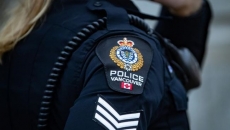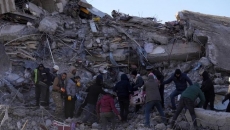OTTAWA - The Public Order Emergency Commission says the Liberal government met the "very high threshold" for invoking the Emergencies Act amid the weeks-long "Freedom Convoy" protests last winter.
"I do not come to this conclusion easily," Justice Paul Rouleau said in a brief statement after the historic report was tabled in Parliament.
The 2,000-page report called the "Freedom Convoy" a "singular moment in history" exacerbated by the COVID-19 pandemic as well as online misinformation and disinformation.
Live from Ottawa: I’m responding to Justice Rouleau’s report on the Emergencies Act. Tune in here: https://t.co/m7Sfg9UEOK
— Justin Trudeau (@JustinTrudeau) February 17, 2023
He concluded that a series of policing failures and a "failure of federalism" led to protest that spun out of control and had a striking impact on Ottawa residents.
"It is regrettable that such a situation arose here, because in my view, it could have been avoided," Rouleau wrote.
The highly anticipated document is the culmination of more than 300 hours of testimony and 9,000 documents entered into evidence during seven weeks of hearing last fall.
The inquiry heard from more than 100 witnesses, including Prime Minister Justin Trudeau and several other cabinet members, senior bureaucrats, protest participants, police and City of Ottawa officials.
The examination was stipulated to take place after the place after invocation of the Emergencies Act, which replaced the War Measures Act in 1988.
Trudeau became the first prime minister to trigger the law on Feb. 14, allowing for temporary measures including regulation and prohibition of public assemblies, the designation of secure places, direction to banks to freeze assets and a ban on support for participants.
He did so in the face of protests staged in the streets around Parliament Hill and at several border crossing, which Trudeau's government has always maintained hit the bar for being declared a public order emergency.
In his report, Rouleau said most of the emergency measures taken under the act were appropriate and reasonable, while describing others, such as the power to suspend vehicle insurance, as counterproductive.
That measure in particular could have been dangerous, the commissioner said. The report said that measure was viewed as so problematic that the RCMP decided not to provide a list of "designated persons" taking part in the protests to insurance companies.
Overall, Rouleau made 56 recommendations, with 27 directed at how to improve police operations, as well as several aimed at the future use of the act itself.
Over five volumes of documents, he described in painstaking detail the genesis of the protests, the response by police and different levels of government, as well as the actions of the protesters and the role social media and false information played in fuelling the demonstrations.
“Having reviewed that evidence carefully, it is apparent that there were signals missed, opportunities lost, and delays created that resulted in a situation in the nation’s capital that was far more serious and complex than it might have otherwise been," he said.
Rouleau said he does not accept assertions from different convoy organizers that the protest in Ottawa was lawful and peaceful. He noted that while some protesters had a positive experience "such as honking, drinking and dancing in the streets,” residents of Ottawa experienced these as “harassing and intimidating.”
"The bigger picture reveals that the situation in Ottawa was unsafe and chaotic," he said.
Rouleau said COVID-19 restrictions ushered in to stem the spread of the virus "had a profound impact on many Canadians."
The image of the trucker proved to be a "powerful symbol."
The protest, which started in earnest during the final weekend of January, turned into an "occupation" the following Monday when demonstrators refused in budge.
Up until that point, Rouleau said, "the protesters had, in effect, been invited to park their trucks for the weekend in various locations in the downtown core.”
The report described the leadership of the convoy movement as “fractured and divided,” saying all nearly all the organizers testified about “various levels of dysfunction and power struggles.”
Rouleau said he did not believe Ottawa protest organizers did all they could to stop the harassment and other negative behaviour residents in the city were experiencing.
“While it is important to recognize the presence of controversial and extreme elements at the protests, it should not detract from my findings that many and perhaps most of the protesters sought to engage in legitimate and lawful protests," Rouleau said.
"Their participation alone does not mean that they supported or condoned the conduct of extreme or fringe participants.”






